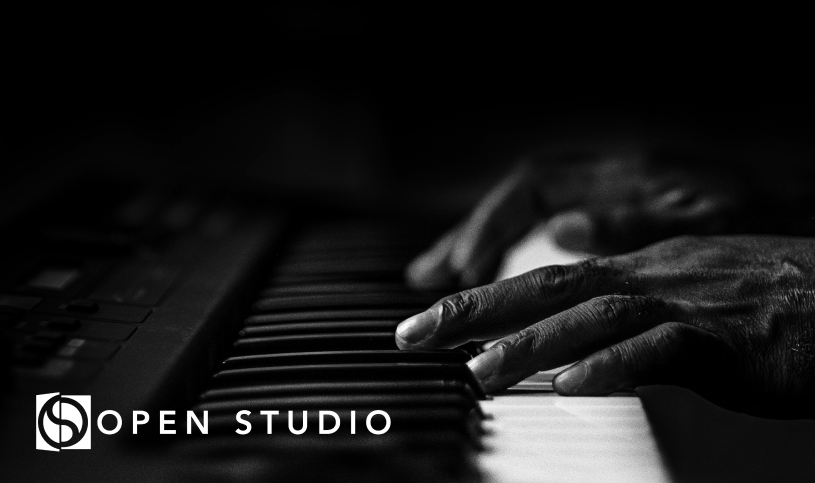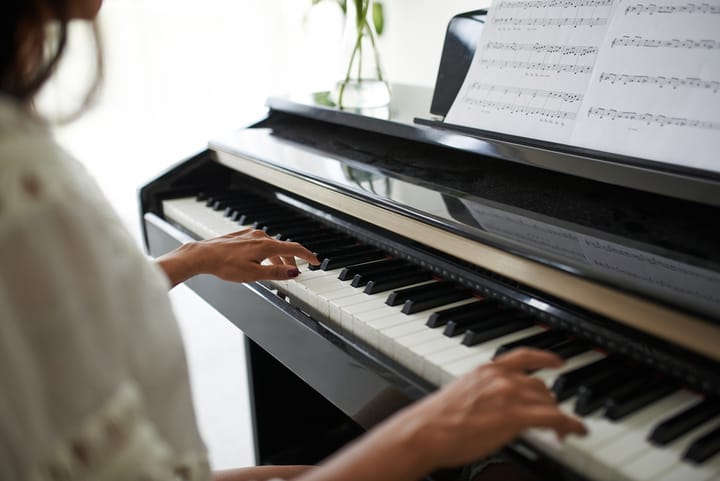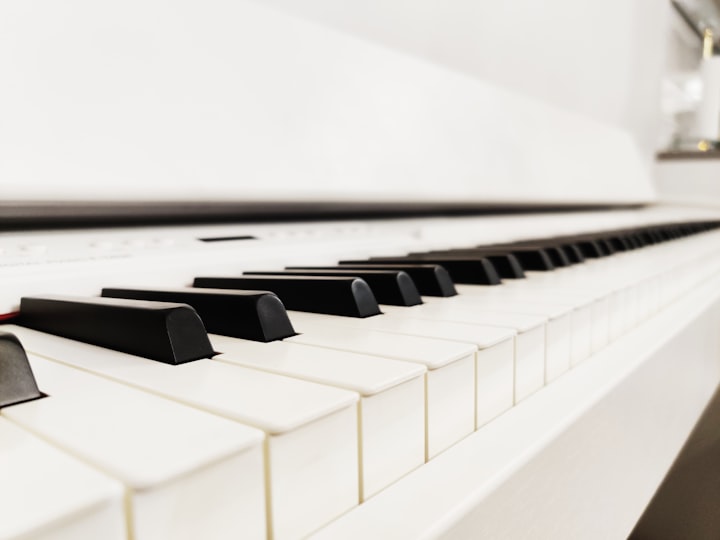The Ultimate Beginner's Guide to Playing Piano: Benefits, Tips, and How to Start

At Pianoers.com, we will do our best to make you feel welcome – we want you to find enough helpful information, resources, tips, and videos/tutorials to keep you coming back for more!
Personally, I prefer learning to play the keyboard or the piano from videos, and also by reading tips online.
The piano, with its elegant spread of black and white keys, holds an undeniable allure. Perhaps you've always dreamed of mastering those melodies that fill concert halls or linger in your favorite movie soundtracks. Maybe you crave a new creative outlet, a way to tap into emotions and add a richer dimension to your life.
Learning piano is a journey of both joy and challenge. It demands patience, but offers rewards that reverberate far beyond the instrument itself. From sharpening your mind to offering a powerful form of self-expression, the piano opens up a world of possibility.
This guide is designed to light the path for aspiring pianists. We'll explore why the piano is a worthwhile pursuit, provide practical tips for starting out, and help you navigate the inevitable bumps along the road.
Why Learn Piano?
The decision to learn the piano carries a certain weight – it invites commitment and promises a degree of challenge. Yet, the rewards far eclipse the effort. Beyond the sheer satisfaction of mastering a beloved song, the piano has the capacity to enrich your life in unexpected ways.
- Cognitive Boost: Studies suggest that learning piano activates diverse regions of the brain, enhancing memory, problem-solving abilities, and overall mental sharpness. It's an investment in a more agile mind, regardless of age.
- Emotional Resonance: The piano becomes a vehicle to tap into the spectrum of human experience. Whether expressing joy, tranquility, or a complex blend of feelings, music offers an outlet when words fall short.
- A Constant Counterpoint: In a world saturated with distraction, the focused act of playing piano offers respite. Worries fade as your attention is drawn inward, to the rhythm and melody taking shape beneath your fingertips.
- Community and Collaboration: Music has a unique ability to unite people. Learning piano can lead to collaborations, shared passion, and a sense of belonging to a wider community of musicians.
- A Gift That Grows: The piano is a lifelong companion. Your relationship with the instrument evolves over time, shaped by your dedication and changing interests. Its potential is limitless.
Learning piano is a personal endeavor with multifaceted benefits. It's a testament to the enduring power of music to uplift, inspire, and fundamentally enrich our lives.
Essential Tips for Starting Your Piano Journey
With a decision made and excitement buzzing, it's time to translate that energy into action. These essentials will set you up for success as you navigate the early stages of learning the piano.
1. The Right Instrument (and the Right Mindset)
You don't need a concert grand piano to begin. A simple keyboard with 61 or more keys is perfectly sufficient for a beginner. If space and budget allow, a full 88-key digital piano provides a more realistic acoustic piano feel.
Beyond the instrument itself, cultivate the right mindset. Learning takes time and patience. Celebrate small victories and embrace the challenges as opportunities for growth.
2. Finding Your Learning Style
The beauty of the modern age is the sheer variety of learning paths available:
- Structured Courses: Online platforms or books offer guided lessons, breaking down skills step-by-step. This is ideal for those who prefer a clear roadmap.
- YouTube Tutorials: A vast library of free lessons on specific songs, techniques, or music theory concepts. Perfect for supplementing structured learning or targeting your own interests.
- Traditional Teacher: Private lessons provide personalized feedback and accountability. Consider this if you thrive on one-on-one guidance or want to tackle more advanced repertoire.
There's no single "best" method. Experiment to find what resonates with you, and don't be afraid to combine approaches as your needs evolve.
3. The Fundamentals: Building Your Foundation
Regardless of your preferred learning method, these core elements form the bedrock of your piano journey:
- Proper Posture and Technique: Good habits established early prevent frustration and potential injuries down the line. Pay attention to hand positioning, finger independence, and relaxed movements.
- Music Theory Basics: Understanding scales, chords, and how to read sheet music will empower you to play any piece, not just those learned by rote.
- Rhythm and Timing: Music is as much about the notes you play as the spaces between them. Practice with a metronome to develop a strong sense of internal rhythm.
4. Make Practice a Priority (and Enjoyable!)
Consistency is key. Short, focused daily practice sessions are far more effective than sporadic marathon sessions. Find a dedicated time and space where you can practice without distractions.
Even within these sessions, quality trumps quantity. Focus on mastering small sections, playing slowly and accurately. Balance technical exercises with playing pieces you genuinely enjoy— passion is your greatest fuel.
5. Be Patient and Trust the Process
Some days will flow effortlessly, while others might feel like a struggle. This is perfectly normal. Don't compare yourself to others; your journey is uniquely yours. Acknowledge progress, be kind to yourself through the inevitable plateaus, and remember why you started playing in the first place.
Additional Considerations:
- Don't be afraid to ask for help. Online forums and communities are excellent resources for support and troubleshooting common challenges.
- Explore different genres and styles. Discover what truly ignites your musical spark – classical, jazz, pop, or something completely unexpected!
The path to becoming a pianist is both rewarding and demanding. By embracing a structured approach, fostering a love for learning, and prioritizing consistent practice, you'll lay the foundation for a lifelong musical journey.
Overcoming Challenges
Every learning journey has its peaks and valleys. Anticipating potential roadblocks empowers you to navigate them with determination and grace. Let's address some common challenges faced by aspiring pianists:
- The Time Factor: Finding time to practice in a busy schedule can feel daunting. The good news is, consistency often matters more than sheer duration. Break your practice into manageable chunks throughout the week – even 15 minutes a day makes a difference. Treat it as a non-negotiable appointment with yourself.
- Finger Coordination (or Lack Thereof): That stubborn independence of fingers can be a source of early frustration. Don't despair! Targeted exercises focused on strengthening individual fingers and slow, deliberate practice of scales and arpeggios will gradually build dexterity.
- Feeling Overwhelmed: Between deciphering sheet music, mastering new techniques, and coordinating both hands, it's natural to feel a bit overwhelmed at times. Break down complex pieces into small, achievable sections. Focus on one element at a time (rhythm, right hand melody, left hand accompaniment).
- Plateaus and Setbacks: There will be days when progress seems to stall. Don't take this as a sign of failure. Sometimes, taking a short break, revisiting a previously mastered piece to boost confidence, or trying a completely different style can reset your motivation and offer fresh perspective.
- Maintaining Motivation: Initial enthusiasm can naturally wane as the realities of practice set in. Remind yourself why you began this journey. Set small achievable goals, celebrate milestones, and don't hesitate to find inspiration – attend a concert, listen to your favorite pianists, or join an online music community for support.
Remember: Challenges are an integral part of growth. Rather than viewing them as obstacles, see them as opportunities to develop patience, problem-solving skills, and the resilience that will carry you far beyond the piano.
Resources to Fuel Your Learning
The vast world of piano resources can be overwhelming at first. Consider this curated selection to jumpstart your journey, regardless of your preferred learning style or experience level.
Types of Resources
- Online Courses: Platforms like Playground Sessions, Flowkey, and Pianote offer structured lessons, often with interactive elements and progress tracking.
- YouTube Channels: Channels like Hoffman Academy, PianoTV, and Josh Wright offer a wealth of free tutorials on technique, theory, and specific songs.
- Apps: Apps like Simply Piano and Yousician provide gamified learning experiences, perfect for supplementing your main practice.
- Books & Sheet Music: Classic method books like Alfred's Basic Adult Piano Course offer a time-tested approach. Look for beginner collections of popular songs or within your favorite genres.
- Music Communities: Online forums and social media groups connect you with fellow learners, offer support, and provide a space to share your progress.
Choosing the Right Resources:
- Skill Level: Match the complexity of the resource to your current ability. Look for materials explicitly labeled as 'beginner' friendly.
- Musical Interests: If your goal is to play your favorite pop songs, prioritize resources focusing on chord patterns and popular melodies. Explore jazz, blues, or classical-focused materials if those genres ignite your passion.
- Cost: Many excellent resources are entirely free, while others offer subscription models or one-time purchases.
A Note on Exploration:
Don't be afraid to experiment! A mix of resources often proves most beneficial. If something isn't working for you, don't hesitate to switch gears. Part of the adventure is discovering what fuels your learning and keeps the music flowing.
Your piano journey has officially begun. There will be moments of pure joy as those first melodies take shape, along with times when practice feels challenging. Remember, it's the cumulative progress that matters – the dedication you show day after day, the small victories that build confidence, and the deepening connection you form with the music itself.
The world of piano offers endless possibilities. Whether you dream of serenading loved ones at gatherings, finding solace through music after long days, or venturing into the vibrant realm of composition, the instrument is yours to shape.
Keep that initial spark of excitement alive. Be patient with yourself, embrace the learning process, and above all, keep playing. The music you create is a testament to your unique journey and an expression of the beauty that lies within you.
To your Successful and Exciting Musical Journey - Katarina




Comments ()